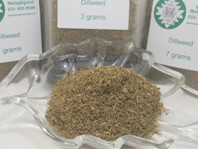Metaphysical Properties Of Dill Weed
Official Name: Anethum graveolens
Other Names: Aneton, Dill, Dilly, Garden Dill, Chebbit, Sowa, Keper, Hulwa, Buzzalchippet
Gender: Masculine
Planet: Mercury
Element: Fire
Metaphysical Powers: Protection, Money, Lust, Love
Common Magickal Uses and Folklore of Dillweed
- Dill Weed is protective when hung at the door and carried on protective sachets.
- Placed in the cradle, it protects children.
- When placed over the door, one ill-disposed or envious of you can enter your home.
- Due to the number of seeds the dill plant produces, it is used on money spells.
- Added to the bath, it makes the bather irresistible, and dill stimulates lust if eaten or smelled.
- Smell dill to cure hiccoughs.
Dillweed is a native plant to southwestern Asia; it is also an herb that grows in Eurasia and North America. The word 'dill' is derived from the Old Norse (a North Germanic language spoken in the 9th to 13th century) word 'dylla' or 'dilla' meaning to lull, sing a lullaby, to soothe children –indicating the soothing and calming effect of dill. Many parts of the world believed in the protective powers of dill. The ancient Romans used dill to bring good fortune –it was valued as a symbol of vitality, joy, and pleasure.
It is an antimicrobial- the oil has scientifically shown effective against several strains of bacteria. It can inhibit Fusarium Graminearum and is toxic to at least five other strains of bacteria. It can improve mental alertness, relieve stress, soothe gas, and is rich in vitamins and minerals like; calcium, iron, manganese, and magnesium.
It can attract romance, dispel nightmares, rid jealousy, aid in emotional balance, protection, attract money and bring good luck. It has been widely used in Love and romance charms and love potions. It is said that a carpet sprinkle can be made that will help to keep unwanted energy from entering a home. There are as many uses in the metaphysical uses as culinary and medicinal uses for this remarkable plant.
People in many different parts of the world have believed in the protective power of dill. In the Middle Ages, dill was an herb used by magicians in spells and charms against witchcraft. In England, it was used to thwart the evil of spells and was believed to be powerful when worn next to bare skin. One mystical belief was hanging stalks of dill over your baby's cradle to keep away bad dreams and calm your child. When being troubled by witches or having nightmares, it was said that the only thing that could help was placing some dill seeds under the pillow.
Dillweed has been used as a seasoning for centuries. The leaves and fruits referred to as seeds of the dill, are widely used in cooking. The flowers of dill are edible as well. Chopped dill leaves are famous for salad seasoning and garnish. Dill can be added to many foods such as sour cream, melted butter, potatoes– the list is vast. Dill's leaves are an excellent complement for fish, particularly salmon and herring. Dill is paired with seafood; Fish is generally served with a dill sauce or cooked in dill.
Dillweed is an excellent source of vitamin C, B group, calcium, iron, and magnesium. Dill has a very long history of use as herbal medicine. The leaves and seeds of dill contain the carvone-rich essential oil used to treat digestive disorders. Dill's essential oil may aid in keeps the stomach healthy, toned, and functioning correctly. Dill can help control infections, rid the body of excess salt and fluid, help lower blood pressure making the heart pump easier. Dill's beneficial effects are astonishingly varied—it can be a stimulant, boost energy, and a sedative.





